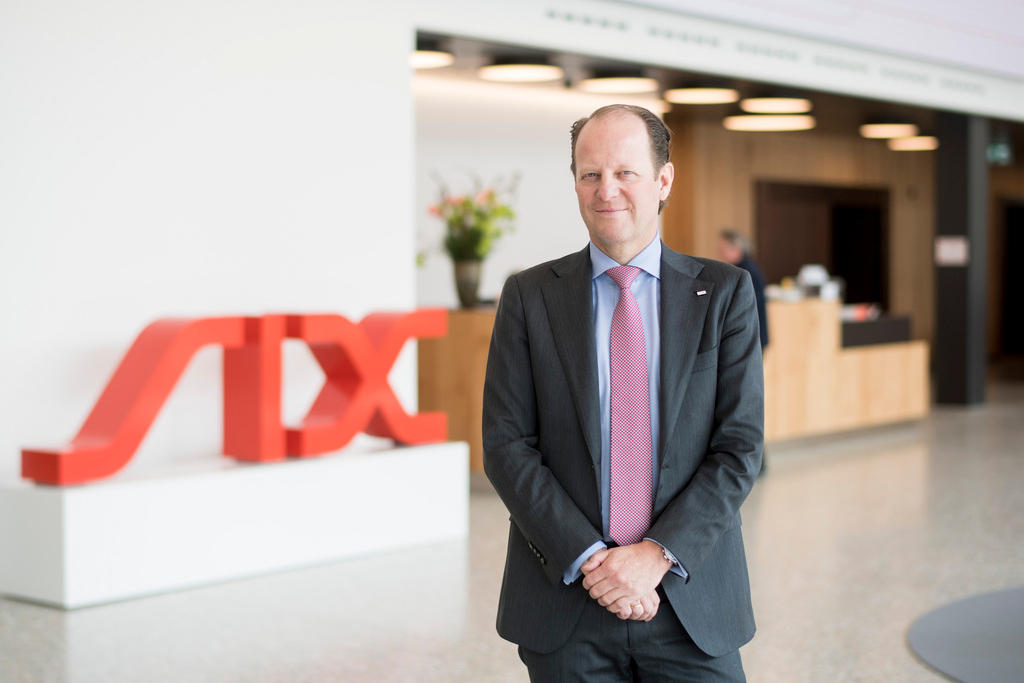Crypto-finance beyond the ‘boom’
Traditional financial players should not violate the core values of crypto-finance, such as decentralisation and community, as they delve deeper into the new digital world, argues Alexis Roussel, co-founder and CEO of Swiss crypto exchange Bity.com.
Crypto-finance is coming out of the woods but governments, banks and industry players in the global financial system need to make sure they understand its core values.
The skyrocketing bitcoin price at the end of 2017 got the financial world talking about the credibility of cryptocurrencies in finance.
Even traditional financial exchanges like CBOE, CME Group and Nasdaq, which began listing Bitcoin futures earlier this year, are capitalising on the unprecedented rise of the bitcoin price. But, they’re missing the point of bitcoin.

More
How a behemoth crypto trading platform could impact Switzerland
They criticise bitcoin for being a highly speculative investment, yet futures are essentially for speculation only, unless you are a miner or large consumer of bitcoin.
There is more to the hype and bubble of the so-called booming cryptocurrency market that traditional financial leaders are failing to see. People need to recognise that bitcoin and other cryptocurrencies are not only to be treated as financial assets. Bitcoin’s technology and network has the ability to bring financial integration to the world.
Crypto-finance is open sourced and community driven in nature, where consumers become the users. These principles must be carried through amidst the current rapid worldwide adoption of cryptocurrencies.
Open to all
Crypto-finance will enable anyone from anywhere in the world to access a truly global financial system and play their part in shaping it via open source software.
The open source component is fundamental to crypto-finance. The term “open source” refers to a type of computing software where the original code is freely available to the public and can be modified.
Open source projects, products and initiatives embrace and celebrate the principles of an open exchange that is collaborative and community-oriented.
It is the foundation upon which we can build a new era of trust in our financial systems.
As a breakaway from the current traditional banking systems that are controlled by central authorities, crypto-finance will not be controlled by any one organisation but rather by everyone in the network.
The structure of crypto-finance will also be free from the hierarchical layers of traditional organisations which often require lengthy, bureaucratic processes to reform.
Imagine a financial system that already has trust and transparency built into its framework. This can be achieved with cryptocurrencies which allow, for the first time in the history of technological advancement, two users to enter into a contract that will self-execute the transaction.
Each cryptocurrency transaction on the blockchain is recorded on an open, distributed platform, creating an inbuilt audit system. There is also inbuilt trust because the transaction is traceable on a ledger. From here, we can move into an era of open and shared computing – something we never experienced before.
Community is everything
Cryptocurrency and blockchain projects are nothing without a community behind them and the same idea applies to crypto-finance.
The use of traditional trading methods by legacy financial institutions with bitcoin futures listings will be limited at harnessing the full potential of the crypto-economy if they do not incorporate communities.
Communities are the places where new social norms are being built. With crypto-finance people can learn how to code and understand cryptography, not just from parents and schools but directly from communities, while building webs of trusts.
If traditional institutions try to slow down, or even fight the rise of crypto-finance, the resilience of technologies such as bitcoin will become more and more obvious.
Crypto-finance is antifragile in nature, allowing communities to avoid unfair situations, like corruption from traditional institutions. The more communities there are around the world that benefit from crypto-finance, the more resilient this new decentralised financial system will be.
Power to the individual
Crypto-finance can bring financial services to the two billion people globally who are currently unbanked due to cost, distance and lack of infrastructure. It will level the playing field and can solve the global financial inclusion problem.
According to the World Bank Group, financial inclusion is a key enabler to reduce extreme poverty and boost shared prosperity. Crypto-finance can be the catalyst for the World Bank’s ambitious global goal to reach Universal Financial Access (UFA) by 2020.
Large corporations and banks with responsibility for the global economy should understand that decentralised blockchain technology will disrupt their business models.
Banking services can essentially run on open blockchains and disintermediate traditional financial institutions. Just as telephone transmissions moved from copper phone lines to transmitting calls over the internet via VoIP without us even noticing, we will move from traditional currency to a tokenised system on open blockchains.
Bitcoin and cryptocurrencies can exist without a reference to an institution or central platform. This means that if people want to buy or sell something, they don’t need to go to a bank to transfer value. Instead they can code a contract with a second party by themselves.
When in June 2014, Bity became the first financial intermediary in Switzerland to be granted the ability to work as a money transmitter for cryptocurrencies, the goal was to build banking-like services on open blockchains and ultimately give control to the people.
To achieve this goal requires a joint effort from all sectors – civil society, governments and business – to build a bridge between the traditional fiat world and crypto-finance world. This bridge will take place within communities like the one we managed to initiate locally Neuchâtel where Bity is a driving force. This same work needs to be done in other communities.
Let’s reinvent the world’s financial infrastructure for the better, from the ground up, within communities.
The views expressed in this article are solely those of the author, and do not necessarily reflect the views of swissinfo.ch.
Opinion series
swissinfo.ch publishes op-ed articles by contributors writing on a wide range of topics – Swiss issues or those that impact Switzerland. The selection of articles presents a diversity of opinions designed to enrich the debate on the issues discussed.

In compliance with the JTI standards
More: SWI swissinfo.ch certified by the Journalism Trust Initiative


You can find an overview of ongoing debates with our journalists here. Please join us!
If you want to start a conversation about a topic raised in this article or want to report factual errors, email us at english@swissinfo.ch.